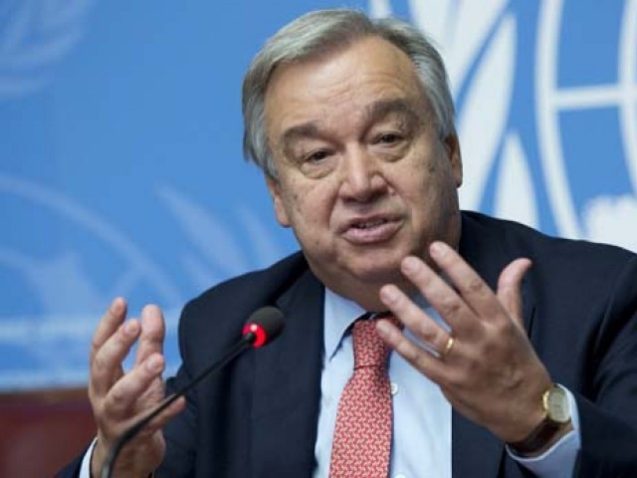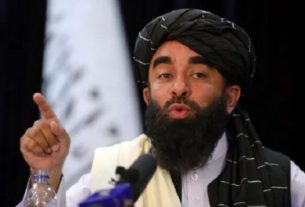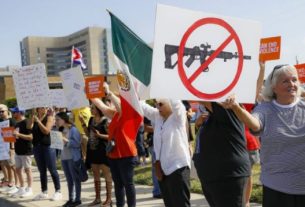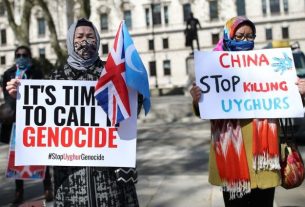Israel will refuse visas to United Nations officials, its ambassador to the UN has said, as the country’s spat with the international organisation deepens.
Gilad Erdan made the statement on Wednesday, according to Israeli media, as the fallout from the UN chief’s speech at the Security Council the previous day continues.
UN Secretary-General Antonio Guterres indirectly criticised Israel for ordering the evacuation of civilians from the north to the south of the Gaza Strip. He also said Hamas’s attack on Israel on October 7 did not happen “in a vacuum” as the Palestinians have been “subjected to 56 years of suffocating occupation”.
Many countries welcomed Guterres’s “very balanced approach”, reported Al Jazeera’s Gabriel Elizondo from New York. However, Israel was “furious” and its officials called on the UN chief to resign.
Israeli Foreign Minister Eli Cohen, who was at the debate, “was so upset”, said Elizondo, “that he cancelled a meeting with the secretary-general that was supposed to happen Tuesday afternoon”.
“It is really unusual to see this sort of reaction against the secretary-general,” Elizondo added.
“Due to his [Guterres’s] remarks, we will refuse to issue visas to UN representatives,” Erdan told Army Radio. “We have already refused a visa for Under-Secretary-General for Humanitarian Affairs Martin Griffiths. The time has come to teach them a lesson.”
Erdan said on X, formerly Twitter, that the UN chief has “expressed an understanding for terrorism and murder” with this speech.
Later, Guterres posted an extract from his speech on X in an apparent bid to show he has criticised both Hamas and Israel for the crisis in Gaza.
“The grievances of the Palestinian people cannot justify the horrific attacks by Hamas. Those horrendous attacks cannot justify the collective punishment of the Palestinian people,” he wrote.
The Palestinian Ministry of Foreign Affairs has condemned Israel’s call for the UN secretary-general to resign, describing it as an “unprovoked attack”.
In a post on X, the Palestinian ministry described Israel’s position as an “extension” of its “disrespect and lack of commitment” to the UN, its charter, and resolutions regarding Palestine.
The Gaza war
Hamas fighters stormed into Israel on October 7 and attacked largely civilian targets, including families and a music festival, killing at least 1,400 people and taking more than 220 captives, according to Israeli officials.
About 5,800 Palestinians, also mostly civilians, have been killed across the Gaza Strip in retaliatory Israeli bombardments, the territory’s Health Ministry said.
Guterres, who last week travelled to the Rafah crossing in a bid to get assistance through the border between Egypt and Gaza, in his speech also welcomed the entry of three aid convoys so far.
But the UN chief said it was just “a drop of aid in an ocean of need”, as the UN Agency for Palestinian Refugees (UNRWA) warned it would be forced to stop working Wednesday due to lack of fuel.
“To ease epic suffering, make the delivery of aid easier and safer, and facilitate the release of hostages. I reiterate my appeal for an immediate humanitarian ceasefire,” Guterres said.
Security Council deadlock
Backed by the United States, Israel has rejected calls to halt the offensive, saying that would only allow Hamas to regroup.
The US last week vetoed a draft resolution on the crisis, saying it did not sufficiently support Israel’s right to respond to Hamas.
Secretary of State Antony Blinken asked the Security Council to back a new US-led resolution that “incorporates substantive feedback”.
The draft, seen by the AFP news agency, would defend the “inherent right of all states” to self-defence while calling for compliance with international law. It would back “humanitarian pauses” to let in aid but not a full ceasefire.
“No member of this Council – no nation in this entire body – could or would tolerate the slaughter of its people,” Blinken said.
Veto-wielding Russia – accustomed to being on the receiving end at the Security Council over its invasion of Ukraine – quickly said it would oppose the US draft.
US regional ally Egypt also criticised the document.
“We’re surprised by new attempts to adopt a resolution that doesn’t include any call for a ceasefire to prevent further deterioration of the situation which might lead the region to a dangerous juncture,” Foreign Minister Sameh Shoukry said.
Foreign Minister Riyad al-Maliki of the Palestinian Authority, a rival of Hamas, called inaction by the Security Council “inexcusable”, as did Jordan, another US partner.
“The Security Council must take a clear stance to reassure two billion Arabs and Muslims that international law will be applied,” Jordanian Foreign Minister Ayman Safadi said.
Jordan and Russia are among nations that requested a meeting on Thursday of the UN General Assembly, whose resolutions are non-binding, due to the Security Council deadlock.__Al Jazeera





